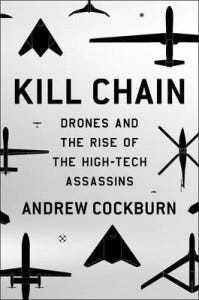A THEORY OF THE DRONE: INHUMANE WARFARE
Buy Now

iPhone, iPad, iPod Touch and Mac

Free Delivery Worldwide

Delivery in Australia & NZ

Kindle In his new book A Theory of the Drone moral philosopher Gregoire Chamayou describes the killer drone as “a dream of a weapon” resulting in confrontation without combat, no prisoners and no sure expectation of victory. It is essential reading for anyone wanting to understand the rise of Islamic State aka ISIS and the West's disastrous, counterproductive responses to the rise of Islamic fundamentalism sweeping the world. Drone warfare has raised profound moral, ethical and legal questions. Not since debates over nuclear warfare has an American military strategy been the subject of such worldwide concern over the development of increasingly inhumane forms of warfare.

Kill Chain Click to Read More
For the first time in history, Chamayou argues, a state has claimed the right to make war across a mobile battlefield that-potentially-spans the globe.
Drones, Chamayou contends, are the "anti-kamikaze," removing all risk from war-making and creating a huge gulf between soldiers and their antagonists. What we are seeing, Chamayou says, is a fundamental transformation of the laws of war that have defined military conflict as between combatants. As more and more drones are launched into battle, war now has the potential to transform into a realm of secretive, targeted assassinations-beyond the view and control not only of potential enemies, but also of citizens of the perpetrating democracies. As The Washington Post recorded in a major review, Chamayou begins by trying to imagine the larger impact of drone warfare on the human condition. He concludes that this kind of assault has radically changed the fundamental principles of war in a way that is harmful not only for those under attack but also for the attackers. Drone warfare takes away the traditions of battle, which by nature is limited and allows for reciprocity — the result being that killing is not a crime but an act of war. In drone warfare, the whole world is a “hunting ground,” the target is unable to retaliate, no quarter can be given in case of last-minute surrender, and only one side risks being killed.

Click to Buy Australia & NZ "Ultimately, drones are the opposite of warfare as we have long understood it: a warrior culture in which readiness to kill has been inseparable from willingness to die. With drones, the ethics of warrior cultures have been superseded, and the warriors have turned into invulnerable, cold-hearted executioners. In addition, the rules and values of counterterrorism have replaced those of counterinsurgency, blithely exchanging the so-called battle for hearts and minds with a staccato delivery of death from above. With drone warfare, there is no victory, just perpetual elimination, a “periodic reaping” that Special Forces operatives, Cockburn tells us, cynically call “mowing the grass.”

Click to Read More "Chamayou tries to predict the long-term consequences of this policy on the human species and sees nothing but darkness. The use of drones to conduct warfare has destabilized the rules of war and weakened the moral fiber of warriors. Chamayou is troubled by drone warfare’s impact on the basic concept of reciprocity that underlies the laws of armed conflict, as well as further considerations such as distinction and proportionality. Ultimately, he reasons, the right to assassinate from the air is a 'forceful distortion of the law of warfare.' By eroding the all-important principle of distinction, mixing up 'combatants and noncombatants,' and defanging accountability for assassination, drone warfare has caused 'a profound crisis in the legal theory of war.' The revolution is astonishing to behold, he says, for we are now living in an unprecedented age of ;one-way-only armed violence,' that is, 'war without combat.' " Chamayou casts forward to look at the costs for a human society which has delegated its decision-making powers, and its battlefield judgments, to killer robots. As military insiders have warned, tactics have swallowed strategy. Assassination by robot is bound to inspire rather than curtail extremism. In Iraq and Afghanistan, and in the war on terror generally, the lesson has been this: “Once you knock them off, a day later you have a new guy who’s smarter, younger, more aggressive and is out for revenge.” Buy Now

iPhone, iPad, iPod Touch and Mac

Free Delivery Worldwide

Delivery in Australia & NZ

Kindle



